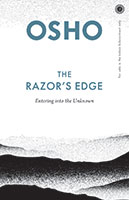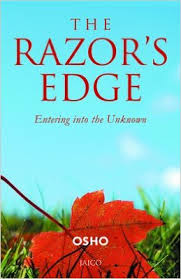Never look backwards
“You have taken the first step towards reality, now never look backwards,  however dangerous it seems – because as questions and answers and I and you start disappearing, you will find yourself entering into a more and more unknown space. This I call ‘the razor’s edge’.” OSHO
however dangerous it seems – because as questions and answers and I and you start disappearing, you will find yourself entering into a more and more unknown space. This I call ‘the razor’s edge’.” OSHO
This question and answer book tells a true story of great trust, love, and humor between Osho and those who have gathered around him again after a long separation. Fresh from their adventures and experiences as seekers alone in the marketplace, this book is full of genuine, pertinent questions and enlightened responses from Osho that will inspire each one of us to live our full potential and risk walking on the razor’s edge of life.
Entering into the Unknown – Nederlands
Het boek The Razor’s Edge is een aanmoediging om door te gaan met uit te vinden wie je echt bent. Alles in je is vals. Het valse en het echte kunnen niet samen, als een mix, bestaan. Er is geen compromis mogelijk: of  je bent vals, of je bent echt. Je persoonlijkheid is je gegeven, het is geen kwestie van dat die uit jezelf gegroeid is. Ze is zoiets als met plastic bloemen het geval is. Plastic bloemen zijn permanent, maar het echte is stromend, er is een continue verandering. Lentes komen en zij gaan weer, niets blijft hetzelfde.
je bent vals, of je bent echt. Je persoonlijkheid is je gegeven, het is geen kwestie van dat die uit jezelf gegroeid is. Ze is zoiets als met plastic bloemen het geval is. Plastic bloemen zijn permanent, maar het echte is stromend, er is een continue verandering. Lentes komen en zij gaan weer, niets blijft hetzelfde.
Het boek The Razor’s Edge is verkrijgbaar bij de Boekhandel of via internet.
OP HET SCHERPST VAN DE SNEDE
Impressie van The Razor’s Edge
“Your whole personality is false because it has been given to you; it is not a growth. It is like plastic flowers – you have put them on a rosebush. They are not part of the bush and they don’t get any nourishment from the bush, although they can deceive people.
“One thing is strange, that the false is more permanent than the real. The real is almost like a river, a continuous change. Springs come and go, nothing remains the same. But the false, plastic flower is permanent; whether spring comes or goes does not matter to it. It is not alive, it is dead.”
“Because of this strangeness humanity has depended more on the false, because the false is more reliable – tomorrow also it will be the same.
“The real is unpredictable.
“One thing can be certainly said about it, that tomorrow it will not be the same. It must have changed, because everything living goes on changing.
“You are asking me, ‘What is the false in me?’ Your question implies that there is something real too. As far as you are concerned, everything is false; and when the false disappears, you will also disappear. The real has no ego, no feeling of I-ness. The real is pure is-ness. It is there, in its all-glory, in its all-golden glamour, in its all-eternal beauty. But it is so vast that you cannot say, ‘It is me.’ It is God, it is the existence, it is reality itself.
as you are concerned, everything is false; and when the false disappears, you will also disappear. The real has no ego, no feeling of I-ness. The real is pure is-ness. It is there, in its all-glory, in its all-golden glamour, in its all-eternal beauty. But it is so vast that you cannot say, ‘It is me.’ It is God, it is the existence, it is reality itself.
“You are the symbol of the false. Just look at your personality – it has all come out of nurture, training, discipline, education. “You have not been allowed to be natural for the simple reason that nature cannot be relied upon. There is no guarantee about nature, there is no security, no safety. Hence every society before the child even comes to know who he is, starts forcing a false mask over his original face, giving him a name, giving him qualities…. And the child is so helpless and so dependent on you that it is almost impossible for the child to rebel. He simply becomes imitation; he starts learning whatever you want him to learn.
“You give him a false name, you give him a false identity, you give him a false pride. You teach him to be obedient; you teach him to be good, whatever is your definition of good; you teach him to be religious, whatever religion you belong to – you make him a Christian, a Hindu, a Mohammedan. And the poor child goes on being covered by layers of falsities.
“Have you ever thought if your being a Christian or a Jew or a Hindu is your choice? Has it been your discovery? Have you ever looked at why you are a Christian? Just because of the accident that you were born to two persons who were Christians.” The Razor’s Edge